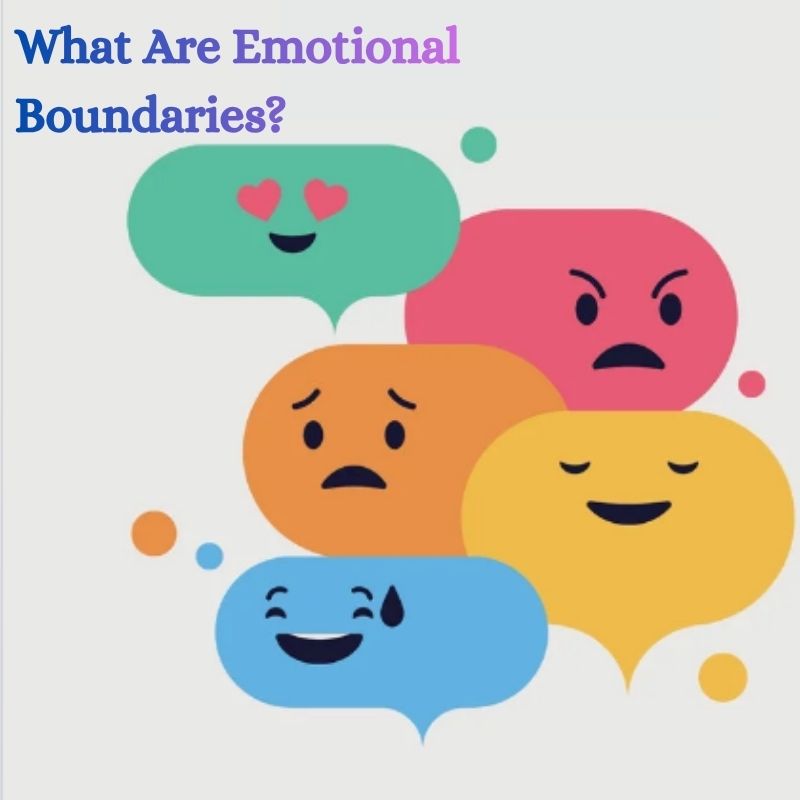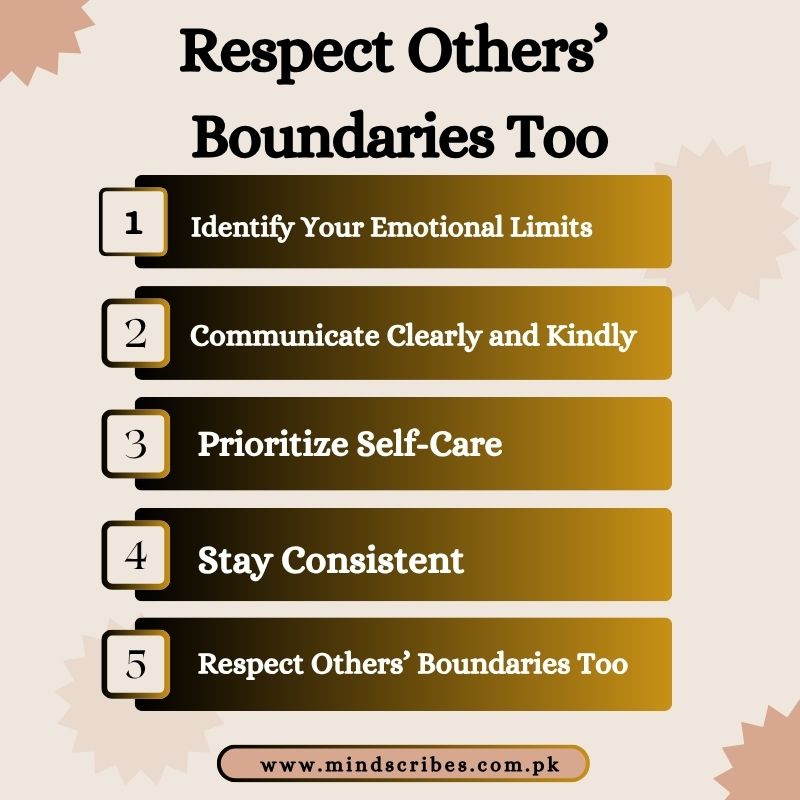In today’s fast-paced and hyperconnected world, it’s easy to feel emotionally drained or overwhelmed by constant demands whether from work, relationships, or social media. The key to maintaining inner peace lies in setting boundaries for emotional well-being. These boundaries aren’t walls; they’re healthy limits that protect your energy, time, and self-worth.
Let’s explore how setting emotional boundaries can help you lead a more balanced, confident, and fulfilling life.
What Are Emotional Boundaries?

Emotional boundaries define how you allow others to treat you and how much emotional energy you’re willing to give. They create a clear line between your feelings and those of others, preventing emotional exhaustion.
For example, saying no to something that drains you or choosing not to engage in arguments that serve no purpose are ways of setting boundaries for emotional well-being. They help you stay grounded and prioritize your peace over pleasing others.
Healthy boundaries come from self-awareness, understanding your limits and communicating them respectfully.
Why Setting Boundaries for Emotional Well-Being Matters
Without boundaries, you may find yourself constantly stressed, resentful, or emotionally depleted. Many people fear that setting limits makes them selfish, but in reality, it’s one of the most self-respecting and compassionate things you can do for both yourself and those around you.
Here’s why setting boundaries for emotional well-being is essential:
- Prevents Burnout: Constantly saying yes to others while ignoring your needs can lead to emotional fatigue and burnout.
- Builds Self-Respect: Boundaries reinforce the idea that your time, energy, and feelings matter.
- Improves Relationships: Clear communication fosters mutual understanding and reduces conflict.
- Boosts Confidence: When you take control of your emotional space, you naturally feel more empowered and secure.
How to Set Healthy Emotional Boundaries

Learning how to set boundaries for emotional well-being takes practice, but the rewards are transformative. Here’s a simple guide to help you begin:
1. Identify Your Emotional Limits
Pay attention to situations that leave you feeling drained or uncomfortable. This awareness is your starting point. Knowing what triggers emotional discomfort helps you understand where boundaries are needed most.
2. Communicate Clearly and Kindly
Express your needs calmly and respectfully. You don’t owe lengthy explanations—simple statements like “I’m not comfortable discussing that” or “I need some time to recharge” are enough.
3. Prioritize Self-Care
Boundaries and self-care go hand in hand. Make time for activities that restore your energy whether that’s journaling, meditating, or simply disconnecting from your phone.
4. Stay Consistent
Consistency helps others understand that your boundaries are firm, not negotiable. Don’t feel guilty for reinforcing them; protecting your peace is not selfish, it’s necessary.
5. Respect Others’ Boundaries Too
Just as you deserve emotional space, so do others. Acknowledging and honoring their boundaries creates balance and mutual respect in relationships.
Signs You Need to Set Better Boundaries
If you often feel resentful, anxious, or overwhelmed, these may be signs that your emotional boundaries need strengthening. You might notice that you:
- Struggle to say “no”
- Feel responsible for other people’s emotions
- Constantly put others’ needs before your own
- Avoid conflict even when you’re uncomfortable
- Feel drained after spending time with certain people
Recognizing these red flags is the first step toward reclaiming your emotional stability and setting healthier limits.
Common Myths About Setting Boundaries
Many misconceptions surround the concept of emotional boundaries. Let’s clear up a few:
- Myth 1: “Boundaries make me selfish.”
- Truth: Boundaries are acts of self-love and respect that protect your emotional health.
- Truth: Boundaries are acts of self-love and respect that protect your emotional health.
- Myth 2: “People won’t like me if I set boundaries.”
- Truth: The right people will respect your limits; those who don’t, reveal their true intentions.
- Truth: The right people will respect your limits; those who don’t, reveal their true intentions.
- Myth 3: “Boundaries are rigid and controlling.”
- Truth: Healthy boundaries are flexible and adapt to your needs, ensuring balance not control.
- Truth: Healthy boundaries are flexible and adapt to your needs, ensuring balance not control.
By understanding these truths, you can let go of guilt and embrace the freedom that comes from setting boundaries for emotional well-being.
The Role of Boundaries in Relationships
Healthy relationships whether romantic, familial, or professional thrive on mutual respect. Boundaries help define expectations and prevent misunderstandings.
When you express your limits clearly, you encourage open communication and trust. This reduces resentment and emotional dependency, allowing both parties to grow individually and together.
For example, telling a friend you need alone time after a busy week doesn’t mean you care less, it means you value the friendship enough to bring your best self to it.
How Setting Boundaries Improves Emotional Well-Being
When you practice setting boundaries for emotional well-being, you’ll notice subtle yet powerful changes in your life:
- You’ll feel more calm and centered.
- Your relationships will become healthier and more fulfilling.
- You’ll develop stronger emotional resilience.
- Your self-esteem and confidence will grow.
Ultimately, boundaries are not about keeping people out, they’re about keeping yourself safe, balanced, and emotionally strong.
Conclusion: Protect Your Peace and Prioritize Yourself
In a world that constantly demands your attention, setting boundaries for emotional well-being is one of the greatest gifts you can give yourself. It’s not about isolation, it’s about intentional living, self-respect, and emotional clarity.
Start today. Reflect on where you feel emotionally drained, speak up for your needs, and commit to protecting your peace. Remember: every healthy “no” creates space for a more meaningful “yes.”
If you’re ready to learn more about personal growth, emotional balance, and mindful living, visit https://mindscribes.com/ for empowering guides and insights designed to help you thrive.
FAQs
1. Why is setting boundaries important for emotional well-being?
Boundaries help you protect your emotional energy, reduce stress, and maintain healthy relationships by defining what behavior is acceptable to you.
2. How can I set boundaries without feeling guilty?
Remind yourself that boundaries are about self-care, not rejection. You’re simply prioritizing your emotional health and creating space for peace.
3. What happens when I don’t set emotional boundaries?
Without boundaries, you may experience burnout, resentment, and emotional exhaustion due to overextending yourself for others.
4. How do I know if my boundaries are being crossed?
You’ll often feel drained, uncomfortable, or resentful after interactions. These feelings signal that it’s time to reassess your limits.

